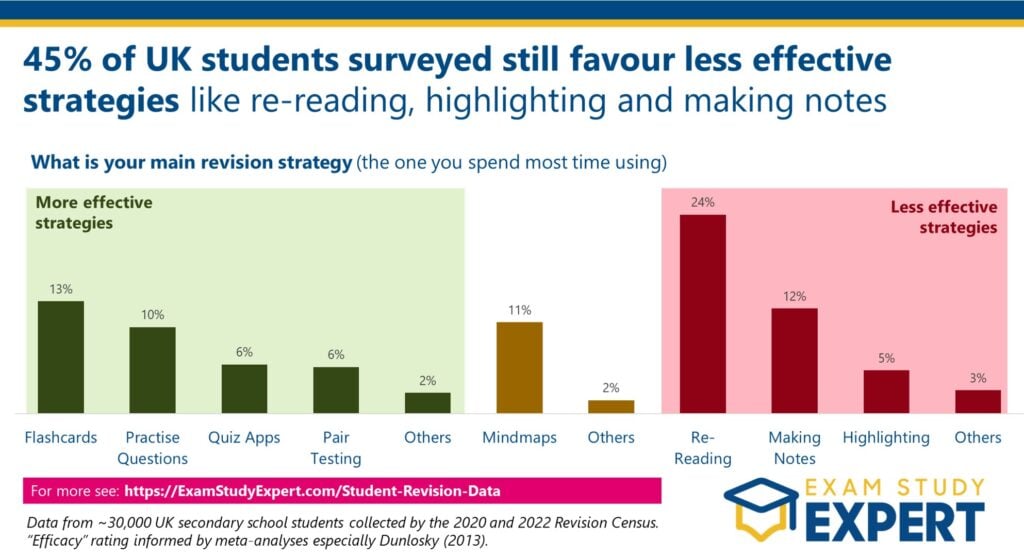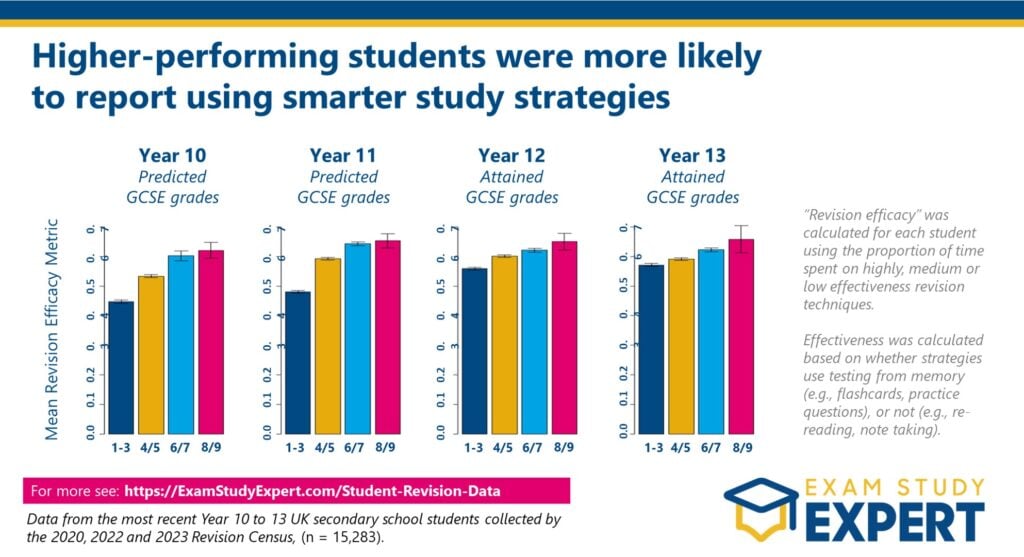Retrieval practice has been demonstrated as the most effective revision method in lab based studies1,2,3, and both simulated4 and real classrooms5.
Understanding how retrieval practice is being used in schools, and the possible barriers for implementation, can empower educators and students to adopt more effective revision techniques.
Across 2020, 2022 and 2023, we ran the “Revision Census” assessing the revision habits of 33,435 students, across 56 English schools.
Students completed a GDPR compliant 15-minute survey, that assessed the use of revision techniques, attitudes to studying, and their predicted & obtained grades.
We have collected data from nearly 40,000 student responses.
Key findings were as follows:
Re-reading, highlighting and making notes still accounts for 37% of UK learners’ revision time, with many students (not shown below) almost exclusively using these strategies.

We asked students to self-report their predicted grades (Y10-11) or actual GCSE grades (Y12-13), to compare attainment to revision efficacy.
Our data showed a clear relationship, with higher grades being associated with smarter strategies.
More evidence of the potential of good strategy to raise standards.

Effective revision isn’t just about technique selection: you’ve also got to use the technique properly!
E.g. nearly 4 in 10 of students who revise with flashcards spend the majority of their flashcard time making or re-reading their cards, rather than testing with them.

Spaced repetition really important, yet 76% of Years 10-13 aren’t spacing their revision consistently.
Some know they should but struggle to put the idea into practice, others still need convincing why it matters.

It’s been exciting to see the swelling interest in evidence based revision strategies in UK schools over the past 5 years in particular.
Our data indicates we’re being successful in getting the word out there, but we’re not done yet; there is still work to do.
For more on how we can help, please see https://examstudyexpert.com/everything#schools.
Wishing your students every success in their exams!
Footnotes:
1.Butler, A. C. (2010). Repeated testing produces superior transfer of learning relative to repeated studying. Journal of Experimental Psychology: Learning, Memory, and Cognition, 36(5), 1118.
2.Roediger III, H. L., & Karpicke, J. D. (2006). Test-enhanced learning: Taking memory tests improves long-term retention. Psychological Science, 17(3), 249-255.
3.Wheeler, M., Ewers, M., & Buonanno, J. (2003). Different rates of forgetting following study versus test trials. Memory, 11(6), 571-580.
4.Roediger III, H. L., & Butler, A. C. (2011). The critical role of retrieval practice in long-term retention. Trends in Cognitive Sciences, 15(1), 20-27.
5.Cogliano, M., Kardash, C. M., & Bernacki, M. L. (2019). The effects of retrieval practice and prior topic knowledge on test performance and confidence judgments. Contemporary Educational Psychology, 56, 117-129.



Hi,
I am currently doing some desk research for a client who is looking at the opportunity within revision guides, digital tools and resources within the UK for GCSE and A Level students. I have come across your wonderful research and I was wondering if you would be able to share any more detail with me or even better the full report? I would be so grateful.
Thanks
Jenna